Peter MALONE
Saturday, 18 September 2021 19:25
Roommate, The
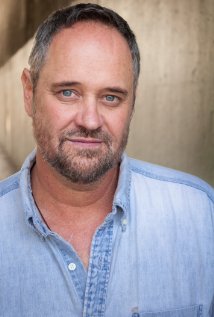
THE ROOMMATE
US, 1984, 96 minutes, Colour.
Lance Guest, Barry Miller.
Directed by Neil Cox.
The Roommate is a Public Broadcasting Service American Playhouse presentation and is based on a story by novelist John Updike. It is set in 1952 at North- Western University, the contrast between a very proper student played by Lance Guest, and a politically conscious eccentric student played by Barry Miller (Fame, The Chosen).
The film is well-written, delineates its characters well, highlights the contrast between attitudes of right and left in the United States of the early '50s. The film highlights the interaction between the two and the changing of perspectives. However, there is a voice-over rueful conversation between the two during the final credits, indicating how far they had grown apart after their time at university.
1. Impact of the telemovie? For the Public Broadcasting Service audience? American audiences, overseas? Themes?
2. The evocation of the '50s, the small town and homes, the university, the campus, church? Musical score?
3. The title and its focus, the contrast between the two men, their background, life at university, interactions, dependence, emotional and intellectual changes? The significance of the final phone call, their subsequent careers, the distance between the two?
4. Orson as the ultra-straight type, his background, family, his father the doctor, dependent, religious, moral? His relationship with Emily, the sexual relationship? His beliefs, conservative style? The opportunity at the university, his settling in, as students, lifestyle? The return home, the meal, the fumbling encounter with Emily? His studies, sport, the visit to church?
5. The contrast with Hub, his background, his odd style and appearance, his causes, manner, conversation, meditation? Yet his capacity for understanding others, the student with the nervous breakdown and his care for him? Study, exams?
6. The interaction between the two, Orson and his complaints, the intolerance? Hub and his sincerity, friendship with Orson, knowing that he was better alone? His eccentric style? Orson and his disbelief, statements about Hub, to his family, to Emily, to the girlfriend on campus? His inability to understand?
7. The portrait of the group, interaction, behaviour, the situations? Taking sides?
8. The student with the breakdown, Hub and his help?
9. The girlfriend, relating to Hub, going out with Orson, the clash? Her indicating how Hub was hurt with Orson wanting to move rooms? Orson going into the other room, his decisions, not moving?
10. The aftermath and the phone calls, Hub and the range of his experience, missionary work, Africa, State Department? Orson and being a doctor, following his father's footsteps, marriage to Emily, divorce, the children? The more things change...?
Published in Movie Reviews
Published in
Movie Reviews
Tagged under
Saturday, 18 September 2021 19:25
Room for Romeo Brass, A
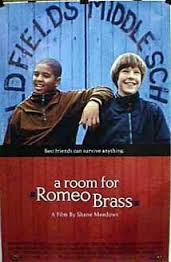
A ROOM FOR ROMEO BRASS
UK, 1999, 95 minutes, Colour.
Andrew Shim, Ben Marshall, Paddy Considine, Frank Harper, Ladine Hall, Vicki McClure?, Julia Ford, James Higgins.
Directed by Shane Meadows.
A Room for Romeo Brass is set in a small town in Nottinghamshire, the story of two 12-year-olds who are friends. It is semi-autobiographical material from Shane Meadows and his friend from his childhood, screenwriter Paul Fraser. The two boys and their families live next door to each other. They are in each other's company all the time until an eccentric man saves them from a fight, is attracted towards Romeo's sister and courts her, takes on a father figure role for Romeo, but is ultimately quite destructive and mad. The breached friendship between the two boys needs to be healed.
Shane Meadows made the very effective 24/7. He uses a number of the same cast and Bob Hoskins for this film. However, the performances of the boys are not particularly strong, especially Ben Marshall as the white boy. The adults are very strong, especially Paddy Considine as the mad and violent adult.
The film shows life on an English estate, family troubles and break-ups, but it also highlights the nature of childhood, the fragility of friendships and the need for bonds between friends.
1.A British slice of life of the '90s? The nature of friendship? Family? Parental figures? Hurt, reconciliation?
2. The Nottinghamshire locations, the town, the naturalism of the atmosphere and locations? The musical score - and the range of songs making comment on the action?
3. The focus on the two boys, their initial walk, the nature of the relationship between the two? Romeo and his background, mixed race? Gavin and his very English attitude? His bad back and the need for the operation? Their happiness together? In each other's houses? Talking things over? The humorous sequence of the sex magazines? Romeo saving Gavin in the fight? The intervention of Morell? Saving the boys? But alienating Romeo from Gavin? Gavin's hurt at being neglected? Going into hospital and no farewell? Romeo coming to his senses, the disillusionment with Morell? The reconciliation? The talk in Gavin's room, the magic, the humour of the finale with Gavin and his magic and Romeo his assistant?
4. The character of Romeo: age, size, being hungry, dominant partner? Protecting Gavin? The nature of their conversations? The sex magazines? The food and Romeo eating? His relationship with his mother, his sister, lying about the food? The return of his father and his strong antagonism towards him? The fight, the friendship with Morell, Gavin and Romeo making jokes, Morell's clothes? Romeo becoming more friendly with Morell, the rides, the fight with his father, going to Morell's house? The martial and manly attitude? The clashes, his sister falling out with Morell? Morell's brutality in the house? The confrontation with Gavin's father, Romeo's father dominating him? Romeo and his seeing things more clearly, reconciling with Gavin?
5. The character of Gavin, white background, his illness? His friendship, his room, his reading, his capacity for writing? The operation? Joining with Romeo in the jokes with Morell? Being abandoned, the operation? Listening to what was happening? His relationship with his mother, his father and the sex magazines? Seeing his parents more clearly? The tutor coming, the classes, his writing, the tutor falling asleep? The reconciliation with Romeo and his assertiveness?
6. Morell and his stopping the fight in the field? Audience sympathy towards him? His attraction towards Romeo's sister, his returning, coming in, the cup of tea, the mad story about his wrestling with the powerful force and his demons? His courting the sister, the new clothes and the boys sending him up? Serious, trying to have a sense of humour - and the intimations of his being abused when he was a child? The outings with the sister? Bringing her home, the sexual come-on and her revulsion? The fight with Romeo's father? Taking Romeo to his house, the military attitudes and his denunciation of Romeo? His stalking the sister, bashing her alleged boyfriend? His confrontation at the house, the threats to Gavin's father? Joe and his saving the day? Morell's madness and violence - and nobody helping him? His future?
7. Romeo's mother and sister, the separation from the father, at home, his sister's work, attractive, saying yes to Morell for politeness' sake, the outing and the drink, her wariness about his stories? His gifts? The sexual come-on and her reaction? Her patience towards her father and supporting him, giving him some money? Romeo's mother, her background, the disillusionment with her husband? His coming back, her quandary what to do, creating tension within the family? Wanting him out?
8. Gavin's parents, ordinary, clashes, love for each other, concern for Gavin? The operation? The tutor? The final confrontation and Morell intimidating Gavin's father, his collapse? The bonds between them all?
9. The atmosphere of the town, the young hooligans in the field, the physiotherapist, the salesman (Meadows himself) at the fish and chip shop? The shops, pubs?
10. The tutor, his support of Gavin - but his going to sleep?
11. The finale with the children bringing their families together? The newly re-found friendship? A slice of life? Portrait of good and evil? Struggles, family dysfunction? Love and friendship?
Published in Movie Reviews
Published in
Movie Reviews
Tagged under
Saturday, 18 September 2021 19:25
Rookie, The
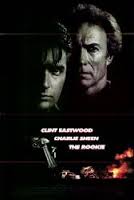
THE ROOKIE
US, 1990, 121 minutes, Colour.
Clint Eastwood, Charlie Sheen, Raul Julia, Sonia Braga, Tom Skerritt, Lara Flynn Boyle.
Directed by Clint Eastwood.
The Rookie is Clint Eastwood's 15th film as director. He is also the star - a variation on the policeman that he has played over the years from Dirty Harry to the tormented man in Tightrope. However, at 60, while he is still full of action, he leaves much of his past action to Charlie Sheen as the rookie. He serves as a kind of father figure to Sheen. Sheen is a serious actor like Eastwood - both of them rarely smile. Raoul Julia and Sonia Braga (who had appeared in Kiss of the Spiderwoman and Moon Over Parador together) are the villains.
The film is full of action, spectacular stunts like chases and crashes on freeways, chases in airports, driving out of an exploding building on the second floor and going into another warehouse across the road.
However, as with so many of Eastwood's films, the mood is dark and much of the action takes place at night. Eastwood gives a complex performance as a Polish policeman in Los Angeles, a man who sees himself as something of a failure but wants to achieve in arresting criminals. Charlie Sheen is a wealthy young man, feeling guilty over the accidental death of his brother, resenting his millionaire father, going on the police force to make his mark. The film portrays his rites of passage and his being moulded in the image of Eastwood.
The film has plenty to entertain action fans. It also embodies Eastwood's beliefs in law and order - and takes a strong stand against criminals and their forfeiting the right to live because of their crimes and cruelty. Not everybody agrees with this kind of heavy and harsh justice.
1. The work of Clint Eastwood, director and star? His police and crime films? The American macho image? Maintaining of law and order?
2. California settings, the city and freeways, airports, warehouses, homes? Police precincts? The musical score?
3. Action, special effects and stunt work? Real/unreal?
4. David and his initial nightmare, at the police board, the death of his brother? The flashbacks? His blaming himself? His motivation? His father commenting on his not forgiving himself? His relationship with Sarah? Studying and giving it up for the police force? His relationship with his parents, his mother's party, her hesitation to kiss her son, interest in the guests? His father and his wealth? His appeal to his father for the $2,000,000 for Nick, talking with his father, pleading with him? Asserting himself? The rookie, Nick's partner, wet behind the ears, the test-drive through the crowded streets, his being able to fix Nick's bike? The flash restaurant and his being known? Punched up in the bar? The threat of the dogs in the car yard? Following Nick, the success of the arrests? Nick not identifying Morales and his going along with it? The casino plan, his fixing the bugging device, shot in the casino? His tracking down people to find Nick, the dead man with the dry-cleaning, his fight and the burning of the bar? The appeal to his father for the money? Riding the bike to save Sarah? Going to the warehouse, reacting to Nick - and the video? The rescue of Nick, the crashed car, the chase, the airport chase and shooting? His confrontation with Liesl? The end - and history repeating itself with his feminine partner? Rites of passage? Man of action? Justice, revenge? The intermixing of the two?
5. Eastwood as Nick, his partner and bond, the death, the initial chase and its spectacular style, his background as racing driver? Relationship with Garcia, getting David as partner? Driving him through the traffic, going to the restaurant, the confrontation with Strom? The cigars, the bikes? His story about himself - and wanting to succeed at least once? Going to the party, David's father trying to buy him? The confrontations with Strom, Morales and his car, the car yard threats? Bugging Strom, the casino plan, his being taken? The warehouse, Liesl and her sadistic sexuality? His escape, being rescued, driving out of the burning building, the chase, the airport, his confrontation with Strom and killing him? His promotion? The father figure - the values that he stood for, the contrast with David's father? His sense of justice? Law and order?
6. Strom, the car-stealing, callous, the shooting of the partner, driving of the vehicle? The getaway? The wealthy restaurant, his associates? Those working for him? Relationship with Liesl - and the lethal dose if either was killed? Anger, losses? His killing of Morales? The house being bugged, the casino and the plan, the failure, taking Nick as hostage, setting up the warehouse, the explosion, the fight and the chase, reaction to Liesl and the video? The chase and his death? Liesl, partnership with Strom, her participating in the thefts? Sadism, sexuality, the encounter with Nick and its being taped? Her violence, shooting of David, his catching her?
7. David's father, wealth, society, the interruption of the board meeting, getting the $2,000,000 - and wanting the bond with his son?
8. The police, their ethos, officials, Garcia, action sequences, shooting?
9. The world of the criminals, stealing the cars, their stooges, the police hold over informers, their reactions, violence and fighting?
10. The atmosphere of Los Angeles - the bar, the toughs, the dogfights?
11. Sarah, relationship with David, the attack by the criminal, her shooting him? David's mother and her interest in society and not him? Heather as his partner? How sympathetic a presentation of women in this man's world?
12. How realistic, unrealistic? Adrenalin-pumping action? Macho image of men and their roles in the police and law and order? Justice and revenge?
Published in Movie Reviews
Published in
Movie Reviews
Tagged under
Saturday, 18 September 2021 19:25
Romero/ 1989
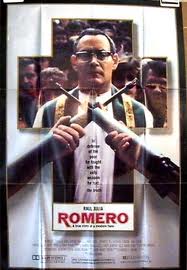
ROMERO
US, 1989, 105 minutes, Colour.
Raul Julia, Richard Jordan, Harold Gould, Tony Plana.
Directed by John Duigan.
Romero is a sincere film about Archbishop Oscar Romero, social troubles in El Salvador, his stances and his assassination in 1980. (This material had been included in Oliver Stone's Salvador as well as Choices of the Heart, the telemovie story of Jean Donovan and the American sisters murdered in El Salvador in 1980.)
The film was produced by Father Edward (Bud) Kaiser, the Paulist priest who had been responsible for many decades for the popular television Insight series. He also produced the telemovie about Ethiopia, We Are The Children. After this screenplay, by John Sacret Young (originator and writer of the television series China Beach), Father Kaiser decided to make a feature film and employed Australian director John Duigan (Winter of Our Dreams, Far East, The Year My Voice Broke, Flirting and the portrait of Catholic war photographer, Damian Parer, The Legend of Damian Parer).
Raoul Julia is excellent as Archbishop Romero. The supporting cast includes Richard Jordan (with a Spanish-American? accent) as Father Grande, the friend of the archbishop.
The film is fairly straightforward in its style, a popular biography of a clergyman whose bookish ways are challenged by the social unrest and atrocities in El Salvador and who realises that Providence has marked him out as a martyr.
The film could be criticised in some ways for its presentation of the landed aristocracy as stereotypes as well as the persecuted people. However, there is an earnestness about the narrative, an invitation for audiences to appreciate the challenge to a man like Romero and realise some of the social injustice in Latin America, especially El Salvador.
1. The portrait of a clergyman? A man who discovers a mission? A portrait of the Catholic church in the '70s and '80s in Central America? A portrait of social unrest and injustice in Central America?
2. The Mexican locations for El Salvador, the countryside, the villages, the city? Poverty, prison? Wealthy aristocracy and their homes? The church? The musical score?
3. The background of the production, Catholic church production - for mainstream audiences?
4. Audience knowledge of Archbishop Romero, of the plight of El Salvador, of conflicts within the Catholic church, of liberation theology?
5. The three-year period, the portrait of El Salvador, Romero and his transformation?
6. The setting: the speeches, the question of free elections, the photographs, Salvadoran history, oppression, the role of the military, the government?
7. Romero as a quiet clergyman, dressed in his cassock? His friendship with Grande, their talks, ideas? The question of the communists? Revolutionaries, the portrait of Jesus Christ the Revolutionary? Liberation theology background? The bus, the elections, the people, guns? The bus shot at? The walk, Romero in the car? Back in his quiet room, the scholarly man with his books? Troubled?
8. Nominated as Archbishop of San Salvador, the hostility of the priests? His episcopal ordination? The greetings, the clergy, Grande, the government, the family? His friendship with the family? The role of the bishops' conference, the meetings, the sinister whisperings of the bishops? Factions? Grande and his intrusion into the banquet with the story of the massacre and the challenge to Romero?
9. The portrait of Father Grande, his ideas, his friendship with Romero? The village? The National Guard, Lieutenant Columa? Trying to explain situations to Romero? The deaths, his grief? The episcopal conference? The car, his own death?
10. Romero changing, the radio broadcasts? The decision about the celebration of Mass? The interdict? The Galedo family? The ransom, his wanting to intercede, waiting for the president? The president and the lies? The transformation of Romero? The interdict, going to get the Blessed Sacrament from the altar, the shooting of the altar, his going into the church? The hostages, betrayal, arrest, the experience of the cell, listening to the torture, the deaths? His wandering in agony? Stripped?
11. The inner change, his prayer, being alone, understanding the government, his stances, questioning his friendships, convictions, growing disgust, going into action, a sense of Providence for his call, defying the authorities, the celebration of the Eucharist, the martyr?
12. The bishops, their stances, military chaplains, the conferences, the veto of presence at the inauguration, working for consensus, the funeral of the murdered, the interdict, episcopal clashes and theological stances? Questions of justice?
13. The clergy, divided, mocking Romero, fighting for the people, in the village, change, the priest coming to confession and the impact on Romero, his arrest, decision about his priesthood, torture and death? The reaction and the clergy wanting to take to arms, the argument about fighting?
14. The Galedo family, their status, landowning, present at the consecration, role in government, the wedding? The daughter, the baptism - and the Indian and the extreme race prejudice? The Minister of Agriculture, the kidnapping, Romero willing to negotiate? His death, the reaction of the family? The families and their wealth, their style and the contrast with the people?
15. The civil authorities, the president, the lies about no political prisoners, the lieutenant, the meetings, the decision concerning Romero's death?
16. The military types (caricatures of themselves with their authoritarian arrogance, dark glasses etc.)? The National Guard, cruelty, opening fire and massacring people, village, bus? At the church? Torture and assassinations?
17. The picture of the Salvadoran people, their suffering, the girl, her work, arrested, tortured, her tongue out? The burial ground? The impact of such suffering?
18. The use of Christ symbolism? Christ as sufferer, saviour, liberator?
19. The film as a portrait, a tribute, a message film?
Published in Movie Reviews
Published in
Movie Reviews
Tagged under
Saturday, 18 September 2021 19:25
Roman Holiday/ 1987
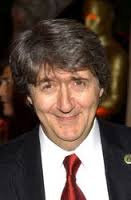
ROMAN HOLIDAY
US, 1987, 100 minutes, Colour.
Tom Conti, Catherine Oxenburg, Ed Begley Jr, Eileen Atkins.
Directed by Noel Nossek.
Roman Holiday is a telemovie remake of the 1953 William Wyler classic with Gregory Peck, Oscar-winning Audrey Hepburn and Eddie Albert.
There does not seem to be a major reason for this telemovie remake. Tom Conti lacks the icon presence and even charm of Gregory Peck. Catherine Oxenburg is attractive but does not have the fey style of Audrey Hepburn. Ed Begley Jnr does not have much to do as the photographer.
There is a British supporting cast, wonderful Roman scenery, a basically entertaining but now familiar story.
1. Entertaining telemovie? Comparisons with the original? Purpose of a remake?
2. Roman locations, the tourist touch? Musical score?
3. The title, the irony with memories of Ancient Rome? With the original story?
4. The princess, background of European royalty, on official tours, the pressure on a young woman, her daily rounds? Her minders? Pressure, the decision to run away, on the park bench, encountering Joe, the night in his apartment, not remembering, gratitude to him, borrowing the money, her not telling the truth? Going out in Rome, buying new clothes, attracted by the city, the people, singing the song? On the motor scooter, the police and her saying she had to go to a wedding and getting the escort? With Leonard? The enjoyment of the day? The phone call? Her decision to go back, the bond with Joe? Discussions with her father? With the protocol managers? The press conference, her diplomatic way of talking with Joe and Leonard? Going back to her job and official statements? The effect of the Roman holiday?
5. Joe, the jaded reporter, the story of the cats? At home, seeing the princess in the street with the prostitutes, not recognising her? The taxi, taking her home, looking after her? The phone call from the boss, the television coverage, the realisation of who she was? The plan to get an interview? Ringing Leonard? Their working together? The outing, entertaining the princess, the photographs? The effect on him, coming alive? The nightclub, the Secret Service, the fight? Her going back? The photos, his decision to give them back to her, the press conference? The effect on him?
6. Leonard, skilled photographer, friendship with Joe, the outing with the princess, the photos, giving them to Joe?
7. European royalty, protocol, the king and his coming to Rome, his own past, discussions with the officials? The princess's chaperone and her concern?
8. Popular fairy tale - given the modern style?
Published in Movie Reviews
Published in
Movie Reviews
Tagged under
Saturday, 18 September 2021 19:25
Rocky V
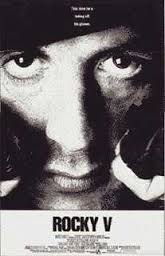
ROCKY V
US, 1990, 104 minutes, Colour.
Sylvester Stallone, Talia Shire, Burgess Meredith, Sage Stallone, Burt Young.
Directed by John G. Avildsen.
Rocky V begins with the final bout of Rocky IV and the immediate aftermath in the dressing room where it is discovered that Rocky is suffering some kind of brain trauma. He then retires, though challenged by an extraordinarily pushy promoter, George Washington Duke (played expertly by Richard Gant).
It seems also that Rocky's finances have been exploited by an unscrupulous accountant and so the family have to move back to the slums of Philadelphia, to their roots.
The main focus is on a young tough boxer from Oklahoma who is befriended by Rocky, and becomes a champion under Rocky's training. He then sells out to Duke. There is a subplot with Rocky's relationship to his young son (played well by Stallone's own son, Sage). The family themes and the boxing themes work quite well together till a final street fight between the young champion and Rocky. It is no secret who wins.
Talia Shire and Burt Young return. There is also a flashback sequence which enabled Burgess Meredith also to reappear. The music is by Bill Conti, the direction by John G. Avildsen, who won an Oscar for directing the first Rocky film. (Avildsen also edits his own films.)
During the final credits there is a very good stills collage of the whole five of the series.
1. Popularity of the series, over 14 years? The place of this fifth film?
2. The progress in Rocky's life, continuity? The clash in the Soviet Union? The return, Rocky and the family going to their origins? The fight up again? The final credits and the overview summary?
3. The Philadelphia settings, wealth, the tough neighbourhood? The choreography of the fights? Editing and collages? The musical score and the Rocky theme?
4. The importance of the editing, special effects, the credits, Rocky IV's bout in the opening, the collages, the pace and tension?
5. Rocky IV and the final bout, the immediate aftermath, the trauma, Adrienne's reaction? Going home, the press conference, his wanting to retire, the reaction of the press? Duke and his PR, pushing in and offering the challenge? Rocky's retirement, the newspaper reactions, his going to the doctors because of Adrienne, their advice about brain trauma?
6. The portrait of the family, the return home to the mansion, the relationship of Rocky to his son, to Adrienne and Paulie? The news about the money, the loss of wealth? Having to sell the mansion? The auction? His son's reaction?
7. Financial deals, the repercussions, Duke and his offering challenges?
8. The picture of the old neighbourhood, the family moving in and the people cheering? The son getting ready to go to school, support of his father, the multinational children, his being bashed, his being warned about scams? Tommy's arrival in the neighbourhood, background from Oklahoma, tough, the bouts at the training centre, his pleading with Rocky, brought home to dinner, living in the house, the long training, the collage of the training and the bouts, media attention, seeing him as Rocky's double, the fights, the wins, the achievement? The effect on Rocky? The effect on his son - ousted from his father's attention, the fight, the taking of the coat, the parallel of his training at the same time as Tommy? Going back to school, standing up for his rights, getting back the coat, making friends with the boys? The young girl and her friendship? The Christmas celebration, Paulie as Santa Claus, Robert and his defiance, sullenness, wearing the earring? Not talking to his father, going out with his friends?
9. Rocky's vicarious success through Tommy, Tommy and his contacts with Duke, the scam, Rocky having to learn, Tommy winning the championship - and giving no thanks to Rocky?
10. The sketch of Duke, his self-confidence, PR style, his entourage, pushy, the plans, watching Tommy's career, setting up the girlfriend, the glamour and the money, the deals and contracts, not bad-mouthing Rocky, coming at Christmas? The final fight, the press conference and the press not accepting Tommy as a genuine champion, his reaction, Tommy fighting Rocky, Duke threatening to Sue if he was hit, his being knocked out?
11. The sketch of Tommy, tough background, his hopes, career, anger with his father? Persuading Rocky and Paulie, pleading, the training, winning? The girl and his attachment, the money, the car? The deals? Becoming champion, angry at the press conference, wanting to fight Rocky, attacking Paulie? The street fight, his brutality, losing?
12. Mickey and the memories of the earlier films, his training of Rocky, his philosophies, Rocky remembering in the gymnasium, Mickey and the bout, his words of wisdom? His appearing during the final fight, encouraging Rocky?
13. Paulie and his place in the family, his ignorance about the money and their losing it? Continually supporting Rocky, the family, Adrienne and the boy? His self-consciousness as Santa Claus? His being attacked at the end, standing back for the fight?
14. Adrienne, the changes in her life, her suffering with Rocky, concern about his health? Antagonism towards Duke? Love for her son, the moving out of the mansion, going to work where she started? Pleading with Rocky, seeing him alienate his son? Urging Rocky to talk to his son?
15. Rocky and the reconciliation with his son, talking things over, looking at his drawings again, the final gift of the cufflink, the gift from Mickey which he had offered to Tommy?
16. The build-up to the finale, the bar, the challenge, the TV? The bare-knuckle fight?
17. The final credits and the summary of Rocky's career?
18. Rocky and his place in the American consciousness? In world consciousness? An archetype of the ordinary man who can be a success?
Published in Movie Reviews
Published in
Movie Reviews
Tagged under
Saturday, 18 September 2021 19:25
Rock Hudson
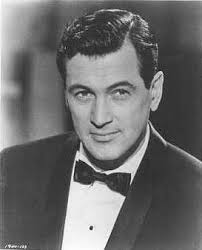
ROCK HUDSON
US, 1990, 97 minutes, Colour.
Thomas Ian Griffiths, Daphne Ashbrook, Diane Ladd, William R.Moses, Andrew Robinson.
Directed by John Nicolella.
Rock Hudson is an American telemovie made within five years of the film star's death. What focused the world's attention on Rock Hudson was that he was the first Hollywood celebrity to admit to suffering from AIDS. He died in October 1985. Soon after, there was a court case by his partner, claiming financial damages because Hudson and his lawyer had conspired not to reveal the physical condition of the star to his companion and the possible danger of health to Mark Christian, the companion. This serves as a framework for the telemovie. The movie also comments on homosexuality and the fact that it had to be kept secret, especially in Hollywood for people to have success in their careers, as well as the emergence of AIDS during the '80s and the need for research to combat the illness.
The film is a Reader's Digest style portrait of the star, his humble origins, the work of his manager and mentor Henry Willson, transforming him from Roy Fitzgerald, the truck driver, into Rock Hudson, the all-American star. It traces his early film career - and also uses newsreel footage of the real Rock Hudson for some of the indications of his success.
The film also indicates the torment of his homosexuality and his inability to admit this in public, the manoeuvres of Henry Willson to keep this concealed from the public, the marriage to Willson's secretary Phyllis Gates as a cover and the possibility for Hudson to enjoy a heterosexual relationship. The film indicates the failure of the marriage and Hudson's promiscuity and growing alcohol abuse. The film also shows his ageing, his success in television with MacMillan? and Wife, and yet the onset of AIDS. The film dramatises his inability to admit that he had AIDS and the attempts to conceal his condition until at last he was exposed and all the world knew his secrets.
The film makes the point about Hollywood and its expectations of morality, the tolerance towards behaviour of the stars and yet an intolerance towards homosexuality. It highlights the effect of this kind of denial and double life on the personality of the star. Thomas Ian Griffith does a fair impersonation of Rock Hudson, though not looking particularly like him unless by virtue of the lighting and camerawork. Diane Ladd gives a good performance as his mother and Andrew Robinson is effective as Willson. There are interesting highlights of Hollywood life with parties, meeting with director Raoul Walsh and the filming of a sequence from Fighter Squadron, scenes on location for Giant, newsreel footage with stars such as Kirk Douglas, an episode at the end of his life when he was sponsoring a charity for Doris Day, as well as a sequence in the direction of the film Seconds with John Frankenheimer and the beginnings of Mac Millan and Wife.
1. The making of a telemovie about Rock Hudson, his personality and his illness so close to the time of his death? Impact for the American audience? His fans around the world? For fans who did not know of his homosexuality and the contrast between image and reality?
2. The themes of homosexuality and the 40 years of Rock Hudson's career? Secrecy, wanting openness? Hollywood double standards? The emergence of AIDS, the change of perspective in the '80s? Rock Hudson's having to cope, his concealing his condition, failing to let Mark Christian know about his condition? The film as a warning? The framework of the Mark Christian case and his suing the estate of Rock Hudson and Mark Miller, his secretary, for damages?
3. The credits at beginning and end with photos of Rock Hudson? The clips during the film of the real Rock Hudson? His status as a film star over several decades, the breadth of his popularity? His image, wanting to be a film star, not an actor? The contract player who became a star? Part of the Hollywood machine, playing to fans? The contrast with the truth and its effect on his life?
4. Roy Fitzgerald's background, the separation of his parents, stepfather and his name, in the armed forces during the war, his discharge and driving a truck? Sending photos to studios? The interview with Henry Willson? The change in his life? His mother and her support, the photo of herself as taller than her son? His taking her to the preview of his first film and her reaction about saving his money? Her sharing his success, crying at Magnificent Obsession? Part of his social life? Love for her son, acceptance - and the news of her death?
5. Rock Hudson's work as a truck driver after the war, the photos, the appointment with Henry Willson, the discussions, wanting to be a star, not an actor, his name being changed? Rock Hudson being an idea and its being manufactured? His clothes at the party, drawing attention, Raoul Walsh and his interest, rehearsing and fluffing the lines in Fighter Squadron? His contract, taking his mother to the preview, his pride in being on the screen? The collage of the advertisements for his films of the late '40s and early '50s? On the set for Tarza, Son of Cochise? Discussions with Willson, fearing he would be sacked, the contract for Magnificent Obsession, becoming a star, going to the preview (and Tim Murphy not allowed to be seen with him)? With Giant, his exasperation with James Dean, his success? All within ten years?
6. The encounter with Tim Murphy and his encouragement, comfortable with him, the sexual liaison? The secrecy of his homosexuality? His comments on hating it, wanting to deny it? Setting up house with Tim, Willson and his vetoing it? Hiding the relationship over the years? Tim not allowed to enter at the preview of Magnificent Obsession? Tim confronting Roy and making him decide about his career and relationships? Confidential Magazine and the threat to expose him? The cover-up, his marriage to Phyllis Gates? His going to the homosexual club and Willson ringing angrily during the night?
7. The public image, grooming for stardom, the starlets? Meeting Phyllis, attracted to her? Falling in love, the hope for a heterosexual relationship? Their time together, the house, sexual compatibility? The motivation for his marriage - and the cover-up? The beach sequence and his drinking, the remarks about homosexuals? The suggestions of his continued attraction to men? His visit to the bar? The confrontation with Phyllis, telling her the truth, the divorce?
8. The contrast with his public success and the collage of actual film clips of the '60s with his real life? The privacy of his home, the men at his home, his drinking?
9. The confrontation with Henry Willson, his dissatisfaction with him, Willson not listening and his sacking him? John Frankenheimer's help with the performance in Seconds, the impact of his weeping in the mirror and breaking it? The box office failure of the film? His decision to become part of MacMillan? and Wife and its success? The interviews, the silence about his private life?
10. His ageing, difficulties, health? The meeting with Marc Christian, interest in his work with tapes and videos? Their life together, becoming sick, pretending that he was not sick? Israel and the filming of The Ambassador, his last film? Going to Paris, hospital, the truth, the treatment? His return to America - his going to the promotion with Doris Day and the ambling nature of his speech about the luggage? His last TV movie? In Paris, the public announcement of his illness? Returning home, with Marc, alone and exposed?
11. Henry Willson, the Hollywood type, his shrewdness, thinking through the Rock Hudson idea and manipulating it? Controlling Rock Hudson's career, covering up his private life? Rock Hudson sacking him?
12. Marc Christian, his work, the meeting with Rock Hudson, the bonds between the two, living together? Concern about his illness? Mark Miller concealing the truth? Hearing the news and saying that he was a dead man? His suing - and his denying bitterness against Rock Hudson? But saying he did the wrong thing in not telling the truth?
13. Phyllis Gates, ingenuous, in love with Rock Hudson, the typical fan, going to the set of Giant, the sexual relationship, the marriage, happiness, growing unhappiness, her horror at the truth? Her biography as one of the bases for the screenplay?
14. AIDS, the emergence in the '80s, Hudson unsure how to handle the situation, keeping the truth concealed within? Miller and his concealing the truth? The doctors in Paris and their advice for treatment?
15. The film as a portrait, expose, the difference between truth and image? Raising the question whether it is better for fans to know the truth or to respond to the image?
Published in Movie Reviews
Published in
Movie Reviews
Tagged under
Saturday, 18 September 2021 19:25
Robocop 2
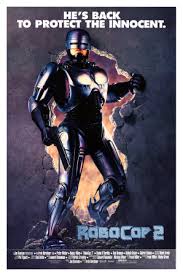
ROBOCOP 2
US, 1990, 118 minutes, Colour.
Peter Weller, Nancy Allen, Dan O'Herlihy, Belinda Bauer, Tom Noonan.
Directed by Irvin Kershner.
Robocop 2 is in the same vein as its original. However, there is a change of director from Dutch Paul Verhoeven (who went on to make Total Recall with Arnold Schwarzenegger) to Irvin Kershner, director of such dramas as The Hoodlum Priest, Loving, as well as spectacles like The Empire Strikes Back, The Return of a Man Called Horse and Never Say Never Again.
Peter Weller, Nancy Allen and Dan O'Herlihy reprise their roles from the original. Weller is still the Robocop trying to administer law and order in a futuristic Detroit which has collapsed. O'Herlihy is the boss of the Omni Corporation. Added to this film are a sinister drug dealer played by Tom Noonan as well as a sinister doctor played by Belinda Bower.
The action is very much slam-bang - almost too much so. For many countries the action had to be trimmed for cinema release.
However, the film echoes concerns at the end of the 20th century about the future of American cities, the decline in economies, the reaction for law and order, the hold of drugs.
1. The impact of this film? Comparisons with the original? Expectations of a sequel?
2. The Detroit world, a city in shambles? The company, its offices, laboratories? A picture of the future?
3. The action sequences, editing and pace, the stunt work, the special effects, especially for Robocop 2? Musical score?
4. The themes of violence - how presented, in context? Too much?
5. The humour of the film - especially with the commercials interspersed, the blend of outrageous violence and black humour? Giving a tone to the film?
6. Murphy as Robocop: at work, separation from his wife, his seeing her? Lewis and her partnership? The confrontations, the drug dealers, the police? His being lectured at? The collapse and in a mess, brought together? The fight against the drug dealers, the boy, Cain? The build-up to the confrontation? The press conference, the fight and his winning? The clash with Robocop 2 and its destruction? Murphy as a person, as a machine? Used by the company? Facing danger, invincible? The end (and a sequel)?
7. The personal tones of the robot cop: memories of his wife, grief? His friendships? Relationship with the police chief?
8. The picture of the firm and the Old Man? Sinister, power-hungry, money no object? The attempts to control Detroit? To control the mayor? The experts, Johnson as his assistant? The role of Dr Faxx? The sauna sequence? Yet his sinister approach, getting rid of opposition? The failed projects, the conference, his sacrificing Dr Faxx? Driving away - to a sequel?
9. Cain and the drugs of the future, the laboratories and the raids, the shoot-outs? Forced labour? His relationship with Hob and Angie? The attacks? The conflagration? The attack on the mayor? His being hurt, dying, transformed by Dr Faxx into a monster? The video screen? His pain, the drug addiction? The confrontation with Robocop and his destruction? Symbol of evil?
10. Hob, a cruel boy, the dealings with the mayor, his death? Angie and her relationship with Cain, dependence on the drugs, with the boy, the set-ups, her death?
11. The drug Nuke, and the power of drugs in the cities, control of the populace? Synthetic drugs?
12. The presentation of the TV media, the personalities, their bland presentation of the news - and the violent visualising of the news? The mayor and his style, chatter, the city in debt, the black humour of the telethon, the deals, destruction and the ending?
13. The Old Man's henchmen, their role in the business, advice? Dispensable? The double-dealings between the mayor's office and that of the Old Man, money deals, deaths?
14. Johnson and his advice for the Old Man, smooth and suave, yet sinister, opposition to Dr Faxx?
16. Dr Faxx, her ambitions, the beautiful but mad scientist, insinuating herself with the old man, her plans, the use of a brain, her control over Robocop, the getting of Cain and making him into Robocop 2? Her own destruction?
17. Lewis, the good cop, the force in Detroit, the attempts to keep law and order, Lewis and her working with Robocop?
18. Themes of the future, the collapse of urban civilisation? The power of the big companies? Robocop and Robocop 2 as symbols of violence and of law and order?
Published in Movie Reviews
Published in
Movie Reviews
Tagged under
Saturday, 18 September 2021 19:25
Robin Hood, Prince of Thieves
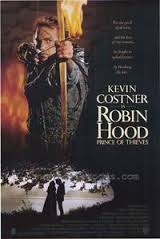
ROBIN HOOD, PRINCE OF THIEVES
US, 1991, 144 minutes, Colour.
Kevin Costner, Morgan Freeman, Alan Rickman, Mary Elizabeth Mastrantonio, Christian Slater, Geraldine Mc Ewan, Brian Blessed, Michael Wincott, Jack Wild, Sean Connery.
Directed by Kevin Reynolds.
Robin Hood, Prince of Thieves is one of the most successful movies of 1991. It capitalised on the popularity of Kevin Costner in such films as No Way Out, The Untouchables, Bull Durham and Field of Dreams. However, he won the Oscar as best director and producer for his Dances With Wolves. He capitalised on his popularity in 1991 by following it with JFK.
Costner is quite mild as Robin Hood, especially in contrast with Errol Flynn and the popular American heroes. (He also pales in comparison with Patrick Bergen, who starred in the John Irvin movie at the same time.)
He also sounds particularly American. However, the supporting cast is quite strong, with Alan Rickman (Die Hard, Quigley, Truly Madly Deeply) giving an over the top and off the wall performance as the Sheriff of Nottingham. British actress Geraldine Mc Keown is his adviser witch. However, second billing is given to Morgan Freeman (Driving Miss Daisy) who portrays a Muslim prince who accompanies Robin Hood back to England. Mary Elizabeth Mastrantonio (Colour of Money, The Abyss, Class Action) is very good as a strong-minded Marian.
The film was made on location in England and re-creates the atmosphere of the period. Audiences familiar with the Robin Hood story were not disappointed. The screenplay was by Penn Denham (writer/director of The Kiss). Not the definitive Robin Hood story - but a popular entertainment.
1. The popularity of the film, of Kevin Costner? The Robin Hood themes of the '90s - audience response from recession times? The popularity of Kevin Costner himself?
2. The American-British? co-production, cast, the mid-Atlantic style?
3. British locations, the atmosphere of Palestine, the sea, England, Sherwood Forest, Nottingham, life in the forest, in the towns? The musical score - and the final song?
4. Audiences and their knowledge of the Robin Hood traditions, memories of Errol Flynn and other stars? The themes of robbing the rich to help the poor? Stories of this period of mediaeval history (Ivanhoe and other popular stories and films)?
5. The opening with the Crusades, Palestine, the prisons, the prisoners suffering? The torture, Robin Hood and his giving of himself, the attack on the jailers? Azim and his help? The execution, the escape, the fight - and Azim's indebtedness to Robin Hood?
6. The voyage, the arrival in England, kissing the ground? Azim and his pledge to help Robin? Their travelling, Azim and his reaction to England, its landscapes, weather? His hopes?
7. Robin's father, the background of his marriage, his mistress and his son? The castle? Robin's antagonism towards him, going to the Crusades? His father's sword? The clash with the Sheriff of Nottingham, his defiance, the sheriff and his men (looking like the Ku Klux Klan)? The confrontation, the fight, his father being hanged? Robin discovering the truth?
8. The encounter with Marian? Her story, in the castle, her maid? Duncan caring for her? Robin's arrival, the clash, the fight - and her revealing the truth? Their memories from their childhood? Talk, attraction, plans, vengeance?
9. Costner as Robin Hood: at the Crusades, his relationship with his father, with Azim? The encounter with Marian? His stances, falling foul of the Sheriff of Nottingham? The exile? Going to the forest, the encounter with Little John and the fight, his almost drowning? Will Scarlett? Friar Tuck and the kegs of beer, Tuck's attack and fight, keeping him in the forest? His going to the forest, his getting the loyalty of those in the forest, his emerging as leader? Exercise of leadership, training?
10. The Sheriff of Nottingham and his personality, ruthless, erratic? His relationship with the witch? Her advice, superstitions? Money, women? His statue? His relationship with Guy of Gisborne? The nobles, treachery to King Richard? The murders, the avarice for the land? His personal style, appearance, his contemporary vocabulary - anachronistic? His performance? Carrying on? Guy's losing Robin Hood - and his killing him? His hold over the bishop? The scribe and his getting information? The build-up to the confrontation, his taking of Marian, the proposal of marriage, luring Robin Hood into Nottingham?
11. Social themes, the people and the oppression, Saxons and Normans, life in the forest, people in the city, ready to join the rebellion? Little John and his wife, the children? Much and the pursuit by Guy of Gisborne? The style of the people in the forest, the merry celebrations, the sequence of the birth, the following dance? The attacks, the two fighters and their discussion about left and right? The dray, their ability to disappear after attacking the sheriff's men in the forest? The battles?
12. Marian and her maid, travelling to Robin Hood, their treatment by the men, Marian's glimpse of Robin swimming, their talk, sharing, the celebrations, the return - and her being taken?
13. Marian and her capture, the fight, going to the sheriff, her resisting his proposals?
14. Duncan, the attack on the castle? The sheriff's men following him, the confrontation in the forest, the fight, the captives - and the preparation for the hanging?
15. Will Scarlett, his antagonism towards Robin, Robin's bewilderment? The betrayal, the return with the information? The young boy seeing him and calling him a traitor? Will Scarlett over the keg of dynamite? His rescue, fighting with Robin Hood's supporters?
16. Robin Hood's plan for the capture of Marian, the model, their studying it? The group entering Nottingham, his spreading himself with dung, Azim disguised as a leper? The various ruses to get in? The keg of dynamite, the fight? The hanging, the behaviour of the sheriff? The men about the die - the nooses? The confusion, Robin Hood saving them? Azim and Robin Hood catapulted into the castle? The fight with the Sheriff of Nottingham, battering the statue with the door, Robin Hood swinging on the curtains? The fight, the tradition of the final confrontation, Robin Hood winning, the sheriff dying?
17. Mortianne, the witch, mediaeval witchcraft and superstition? Her appearance, her reading the entrails and other practices? Her advice and prophecies for the sheriff? Her fear of the painted man? The build-up to the marriage, the sheriff desperate? Azim's arrival, her fear, her being impaled, her final rush and death?
18. The portrait of Azim: the Muslim, in the prison, the pledge, the escape, watching over Robin Hood? Not understanding the English? The clash with Friar Tuck? His helping with the birth of the child? The gunpowder, the fight? The destruction of the witch?
19. The portrait of the church: Friar Tuck, his life, work, the kegs of beer? Supporting the sheriff? The fights and his becoming part of the band of Sherwood Forest? The contrast with the bishop, his greed, wealth, in collusion with the sheriff? His wanting to escape with the jewels? Performing the marriage - after betraying Marian with the message? Friar Tuck fighting with him and his death?
20. King Richard (and the surprise guest spot for Sean Connery)? The background of England, the monarchy, the restoration of order?
21. The popular action themes? The social themes? The stuff of legend?
Published in Movie Reviews
Published in
Movie Reviews
Tagged under
Saturday, 18 September 2021 19:24
Roadhouse 66
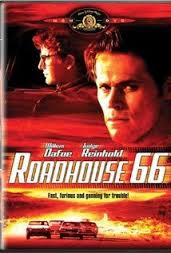
ROADHOUSE 66
US, 1984, 90 minutes, Colour.
Judge Reinhold, Willem Dafoe, Kate Vernon, Stephen Elliot.
Directed by John Mark Robinson.
Roadhouse 66 is a piece of Americana, two young Americans on the road and in a small American town. Lifestyles, dangers, finding themselves. It is an early star vehicle for Judge Reinhold (Fast Times at Ridgemont High, Beverly Hills Cop series) and Willem Dafoe (To Live and Die in LA and then his great success in Platoon, Last Temptation of Christ, Mississippi Burning).
The film is one of those geared for the youth audience, focusing on the road, cars, roadhouses, gangs, races. It is fairly inconsequential - typical of so many films of the '80s.
1. Enjoyable film about youth? The road? Small American town life?
2. The Arizona landscapes, towns? Stunts and special effects? The car race? Songs? Musical score?
3. The title, the road, the roadhouse, the lifestyle in the small town and on the road?
4. Beckman and his travels, his relationship to his father, his work, the shooting of the car? The encounter with Johnny? Trying to get the car fixed, stuck in the town? The meeting with Jessie and Melissa, the infatuation with Melissa? The gang and the confrontations? Old Sam and the cars, the discussions about life? Friendship with Johnny, Johnny leaving and coming back? The possibility of the race, getting the car fixed? In the race, the shots? Pushing the bully off the road? Winning? On his way again - and what he had learnt?
5. Johnny, the hitch-hiker, in the middle of the road, friends with Beckman, helping him with the tower, sleeping in the car, at the bar, the friendship with Jessie, the relationship? Old Sam? His wanting to go on the road again? The past and the band, singing with the band? His coming back, the race, winning? On the road again?
6. Jessie and Melissa, in the town, their different backgrounds? Jessie and her solemness to the men? Changing her mind with the ugly actions of the gang? Helping with the repair of the car? In love with Johnny? The race? Melissa and her studies background, friendship with Beckman, going off with him?
7. Thelma, the roadhouse and its lifestyle, bluff, happy, the band? Her advice? Old Sam, the cars, his advice?
8. The picture of the gang, the shooting, drinking, pool-playing, competitiveness, violence? In the race? Defeat?
9. The gathering together of so many conventions of the American youth film? How successfully? For the '80s?
Published in Movie Reviews
Published in
Movie Reviews
Tagged under